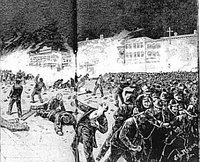In most western countries except the US and the UK, tomorrow is not just
May Day, it is also Labor Day. Yet most people don't know it has its origin in American history.

It started as a
commemoration of the Haymarket Riot of 1886 in Chicago. The unions' demand for the 8 hour work day led to a general strike and demonstrations which resulted in days of violent riots. The 8 hour work day was eventually officially sanctioned but the riots (which also erupted in 1894 and 1919) and the subsequent Red Scare periods did not help make it very popular with the government.
Labor Day has been celebrated on the first Monday in September in the United States since then (it is usually simply as a day of rest and, unlike on May Day, political demonstrations are rare)
In France it did not become an official paid holiday before 1947 (it was actually changed from the Workers Day to Labor Day by Maréchal Pétain in 1941 and it was not a pay day). In most European countries, it is always marked by street rallies of workers led by their trade unions and various large socialist and left-wing parties. It is nothing like the old Soviet military parades of the Cold War era though and most people today- especially the younger generations - see it as an opportunity for extra-leisure.
and left-wing parties. It is nothing like the old Soviet military parades of the Cold War era though and most people today- especially the younger generations - see it as an opportunity for extra-leisure.
Another much older tradition in France is to give each other a bunch of Lily of the Valleys (called Lys des Vallées or more commonly muguet in French). This tradition has its roots in the Paris area (Ile de France) where Lilys symbolized spring and it was made popular by king Charles IX in the 16th century.He considered it a lucky charm. In 1936, the tradition of selling them in the streets began and it is now the only flower which is legal to sell and buy in the streets for anyone - and not just in flower shops. It is an opportunity for students to make some extra-money.
 It started as a commemoration of the Haymarket Riot of 1886 in
It started as a commemoration of the Haymarket Riot of 1886 in  and left-wing parties. It is nothing like the old Soviet military parades of the Cold War era though and most people today- especially the younger generations - see it as an opportunity for extra-leisure.
and left-wing parties. It is nothing like the old Soviet military parades of the Cold War era though and most people today- especially the younger generations - see it as an opportunity for extra-leisure.
0 Comments:
Post a Comment
<< Home